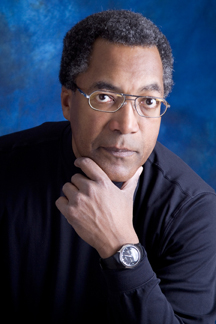 |
| Anthony Elliott |
Quarter Notes, March 2012
Artist Interview with Anthony Elliott
from "QuarterNotes: News and Events of the Prince
George's Philharmonic" - March 2012
Quarter Notes: Thank you so much, Maestro Elliott, for
taking the time to do this interview with us.
We are very much looking forward to performing with you at the end of
this month! May we start with a few
words about your background and training?
Anthony Elliott: I grew up in upstate New York, and was
lucky enough to be in a school system that included strong musical
education. In fourth grade I wanted to
learn to play drums, but the music instructor gave me a cello instead. By high school, I did play a few other instruments
– bass viol and tuba – but the cello became an essential part of my life. In high school I received a scholarship to
attend, for two summers, the music festival at Michigan State University, at
which we studied with outstanding professionals, both performers and conductors. This experience set me on my way toward a
professional career with the cello. I
was most fortunate to attend Indiana University and to study with the legendary
(and still teaching after more than 50 years) cellist Janos Starker!
QN: Fortunate indeed! Did you meet our conductor Charles Ellis at
Indiana?
AE: Oh yes!
Students were seated alphabetically in our Freshman Music Theory course,
and “Elliott” and “Ellis” became fast friends very quickly. We’ve kept in touch ever since, and that’s
how I’ve gotten to know the Prince George’s Philharmonic!
QN: This will be, I believe, the fourth time
that you have worked with the Philharmonic, and we are looking forward to
another visit next season too.
AE: Yes, I first came in 1996, and played the
Elgar concerto with the Philharmonic.
Then in February 2003, I was your guest conductor, and in October 2004,
I played a commissioned piece - a memorial to Martin Luther King. And of course I am looking forward to
performing the Prokofiev with you this month!
QN: I know that after you finished at
Indiana, you began to win prestigious honors in cello performance. The list is long, but we should mention a few,
for example the 1979 Concours Cassado in Florence, Italy, in which you were the
top-ranked American cellist; and in 1987, you won the Feuermann International
Cello Competition. Congratulations! But now, let’s talk about the Prokofiev Sinfonia Concertante. Have you been performing this amazing piece
for many years, and is it a favorite of yours?
AE: Yes, I tackled
this amazing piece of music early in my career.
As you know, it was rewritten by Prokofiev in the early 1950s from a
cello concerto that he had written many years earlier. He worked with the young but already renowned
cellist Mstislav Rostropovich on the adaptation, making the concerto flashier
and more complex, and taking advantage of the amazing virtuosity of the cello.
You have to remember that the Soviet Union put severe limits on composers, and
could ruin them by labeling them too “western” – Prokofiev poured his dark
Russian soul into this work, giving it both a sharp acerbic edge as well as an
impassioned lyricism.
But I want to tell you of my own very special experience
with Rostropovich and this Prokofiev piece.
In the early 1970s, when I was playing with the Toronto Symphony
Orchestra, and when the Soviet Union allowed Rostropovich to travel outside
Russia, the renowned cellist came to Toronto to perform with the
orchestra. I arranged to have an
audience with Rostropovich, took my cello to his hotel room, and played for him
and talked with him for about 2-1/2 hours.
Most of our time was spent on the Prokofiev Sinfonia Concertante, and he was wonderfully generous with instruction
and suggestions. In fact, after his
performance, he contacted me again with additional suggestions that had
occurred to him during his performance of other pieces. He was a most outstanding and generous
artist, and his influence on my career, especially in regard to this piece, was
huge.
QN: The Sinfonia
Concertante is a very challenging piece, especially for the performer, but
also for the audience. Many of us in the
Philharmonic had never heard it before; it is taking time and effort to get
into it, though I think that most of us are already hooked! It will probably be hard for the audience to
grasp it in just one hearing. Do you
agree?
AE: That is probably true, but my hope is that it
will raise in the audience enough interest and curiosity that they will make a
point of hearing it again and again.
QN: And what a gift you will have given
them! Thank you so much! We are really looking forward to March 31!
No comments:
Post a Comment